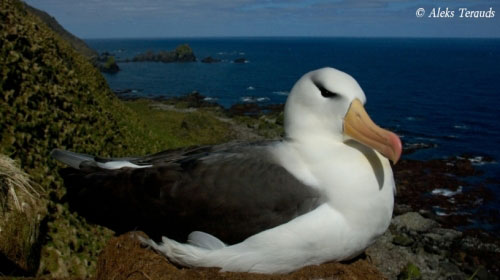Paulo Catry of the Institute of Applied Psychology - Eco-ethology Research Unit in Lisbon, Portugal and colleagues in a study published in the Journal of Avian Biology have looked at changes in brood-guard duration in Black-browed Albatrosses Thalassarche melanophris over a four-year period.

The paper's abstract follows:
"In birds, the period spent brooding or guarding young chicks is highly variable, but such variation has seldom been studied. Previous single-year studies of Antarctic Petrels Thalassoica antarctica and Grey-headed Albatrosses Thalassarche chrysostoma revealed a pronounced seasonal decline in brood-guarding duration and gave rise to the ‘synchronisation hypothesis', which suggests that some of the variation in the length of the brood-guarding stage is related to predictable seasonal changes in the risk of chick predation. We tested the predictions of this and three other hypotheses in a two-site, four-year study of the Black-browed Albatross T. melanophris. The existence of a pronounced seasonal decline in brood-guarding duration was apparent at both sites, and in years of contrasting food availability, providing further support for the ‘synchronisation hypothesis'. Alternative explanations for this pattern are that short brood-guarding periods for late-hatched chicks result from a seasonal decline in food availability or from the fact that early nesting birds are of higher individual quality. However, these explanations are at odds with the absence of a seasonal decline in early chick growth or in probability of chick survival. Furthermore, adult quality (measured as past reproductive performance) had a weak and inconsistent effect on the duration of brood-guarding. Weather changes explained some of the variation in brood-guarding, but there were no differences between regions of contrasting climates. Individual pairs displayed a degree of inter-annual consistency in brood-guarding duration and, at least in some years, longer brood-guarding resulted in higher fledging probability. We speculate that a higher investment in brood-guarding increases the cost of reproduction, which counteracts other selective pressures that would otherwise lead to longer brood-guarding durations."
Reference:
Catry, P., Phillips, R.A., Forster, I.P., Matias, R., Lecoq, M., Granadeiro, J.P. & Strange, I.J. 2010. Brood-guarding duration in black-browed albatrosses Thalassarche melanophris: temporal, geographical and individual variation. Journal of Avian Biology 41: 460-469. http://onlinelibrary.wiley.com/doi/10.1111/j.1600-048X.2010.05029.x/abstract
John Cooper, ACAP Information Officer, 7 November 2010

 Français
Français  English
English  Español
Español